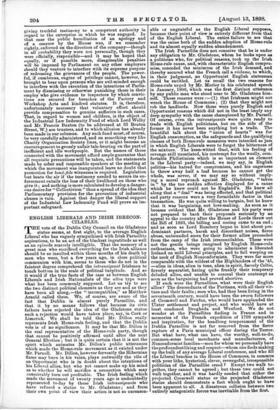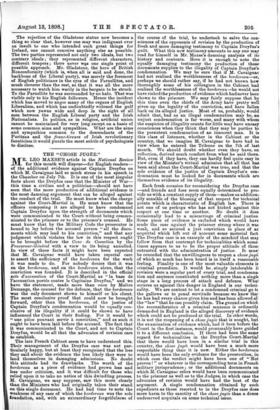ENGLISH LIBERALS AND IRISH IRRECON- CILABLES. T HE vote of the
Dublin City Council on the Gladstone statue seems, at first sight, to the average English Liberal who has vaguely sympathised with Irish Parnellite aspirations, to be an act of the blackest ingratitude as well as an episode scarcely intelligible. That the memory of a great man who sacrificed everything for the Irish alliance should be so insulted within three months of his death by men who were, but a few years ago, in close political communion with him, seems to those who do not in the faintest degree comprehend the intransigeant Irishman to touch bottom in the scale of political turpitude. And so it would if the true facts of the case as between English Liberals and Irish Nationalists of the ultra type were what has been commonly supposed. Let us try to see the two distinct political elements as they are and as they have been all along,.—the " incompatibles," as Matthew Arnold called them. We, of course, are aware of the fact that Dublin is almost purely Parnellite, and that it by no means follows that because its civic fathers have rejected the idea of the Gladstone statue such a rejection would have taken place, say, in Cork or Limerick. We shall be told that Mr. Dillon really represents Irish Home-rule feeling, and that the Dublin vote is of no significance. It may be that Mr. Dillon is the real representative of the Home-rule party, though that cannot be positively affirmed until after the next General Election ; but it is quite certain that it is not the spirit which animates Mr. Dillon's public utterances which made the Home-rule movement as it existed under Mr. Parnell. Mr. Dillon, however fervently the Hibernian flame may burn in his veins, plays outwardly the role of an Opportunist who is in doubt about the intentions of his Liberal allies, but who yet cannot make up his mind as to whether he will sacrifice a connection which may conceivably turn out profitable. The Irish feeling which made the movement of twenty years ago is undoubtedly represented to-day by those Irish intransigeants who have refused a statue to Mr. Gladstone ; and from their own point of view their action is not so unreason- able or ungrateful as the English Liberal supposes, because their point of view is entirely different from that of the English Liberal. The entire failure to see that was the cause both of the sudden adoption of Home-rule and its almost equally sudden abandonment.
The Irish Parnellite does not conceive that he is under any obligation to Mr. Gladstone, whom he looks upon as a politician who, for political reasons, took up the Irish Home-rule cause, and, with characteristic English compro- mise, conceded the minimum of the Irish demand, and thereby secured what the French call a reelame, to which, in their judgment, no Opportunist English statesman could be entitled. Let us recall the two reasons for Home-rule urged by Mr. Morley in his celebrated speech in January, 1886, which was the first distinct utterance by any public man who stood near to Mr. Gladstone him- self. Those reasons were :—(1) that Irishmen might not wreck the House of Commons ; (2) that they might not rob the landlords. Now these were purely English and Opportunist reasons which did not in the least imply any deep sympathy with the cause championed by Mr. Parnell. Of course, even the intransigeants were quite ready to trade with English politicians, but on the side of the former it has never been anything but a trade. The beautiful talk about the " union of hearts " was for English consumption, as the safeguards and the qualifying clauses of both Home-rule measures were intended as jam in which English Liberals were to forget the bitterness of the mixture. The keen-witted Gael, with his feeling of revenge still unsatiated, his contempt for the woolly, com- fortable Philistinism which is so important an element in the Liberal party—indeed, we may say, in English politics—his hatred for compromises, and his eagerness to throw away half a loaf because he cannot get the whole, was never, if we may say so without imply- ing a moral reproach against Mr. Gladstone, " taken in " by the too sudden affection displayed for a cause which he knew could not be England's. He knew all along that a " deal" was being effected, and that political and party reasons were a very formidable factor in that transaction. He was quite willing to bargain, but he knew that it was bargaining, not love-making. As soon as it became evident that Mr. Gladstone and his party were not prepared to back their proposals seriously by an appeal to the country after the House of Lords threw out the Bill of 1893, the billing and cooing came to an end ; and as soon as Lord Rosebery began to hint about pre- dominant partners, harsh and discordant noises, fierce abuse, unbounded scorn for their former allies proceeded from the camp of the Irish irreconcilables. These were not the gentle beings imagined by English Home-rule enthusiasts, who were going to administer a liberated Ireland on mild Liberal principles, and to fall weeping on the neck of English Nonconformists. They were fax more comparable with the wildest of the Highlanders of the '45, —alien in ideas, alien in tone, alien in spirit, fiercely Celtic, fiercely separatist, hating quite frankly their temporary deluded allies, and unable to conceal their contempt as soon as the bargaining had proved abortive.
If such were the Parnellites, what were their English allies ? The descendants of the Puritans, with all their vir- tues and their faults ; men who, had they been living in the seventeenth century, would have been the sworn followers of Cromwell and Fairfax, who would have applauded the Ulster settlement and project, and who would have at least condoned Drogheda and Wexford. We do not wonder at the Parnellites finding in France and in memories of the French expedition of 1798 sympathy and inspiration, for the headlong temperament of the Dublin Parnellite is not far removed from the fierce rapture of a Paris municipal officer during the Terror. But what have, what can have, the worthy, well-to-do, common-sense local merchants and manufacturers, of Nonconformist families—men for whom we personally have the profoundest liking and respect—whom one finds making up the bulk of any average Liberal conference, and who fill the Liberal benches in the House of Commons, in common with your lithe, hysterical, clever, revengeful, irresponsible politician of the Parnellite creed ? Except two walk to- gether, they cannot be agreed ; but these two could not walk together, and it was hardly needed that either the projected Cromwell statue or the projected Gladstone statue should demonstrate a fact which ought to have been apparent to all. A disastrous collision between two entirely antagonistic forces was inevitable from the first. The rejection of the Gladstone statue now becomes a thing so clear that, however one may wax indignant over an insult to one who intended such great things for Ireland, one cannot conceive anything else as possible. The two parties represented not only two ideals, but two contrary ideals ; they represented different characters, different tempers ; there never w4s one single point of possible approach. Mr. Gladstone, the hero of British Nonconformity (which is, when all is said and done, the backbone of the Liberal party), was merely the foremost of English politicians in the eyes of the Parnellites, and much cleverer than the rest, so that it was all the more necessary to watch him warily in the bargain to be struck. To the Parnellite he was surrounded by no halo. That was visible only to his English followers. Hence the incident which has moved to anger many of the organs of English Liberalism, and which has undoubtedly widened the gulf which now yawns wide and deep in the sight of all men between the English Liberal party and the Irish Nationalists. In politics, as in religion, artificial union cannot be maintained for very long except on a basis of some common aims and sympathies. What are the aims and sympathies common to the descendants of the Puritans and the franc-tireurs of Irish revolutionary fanaticism it would puzzle the most subtle of psychologists to disclose.



































 Previous page
Previous page